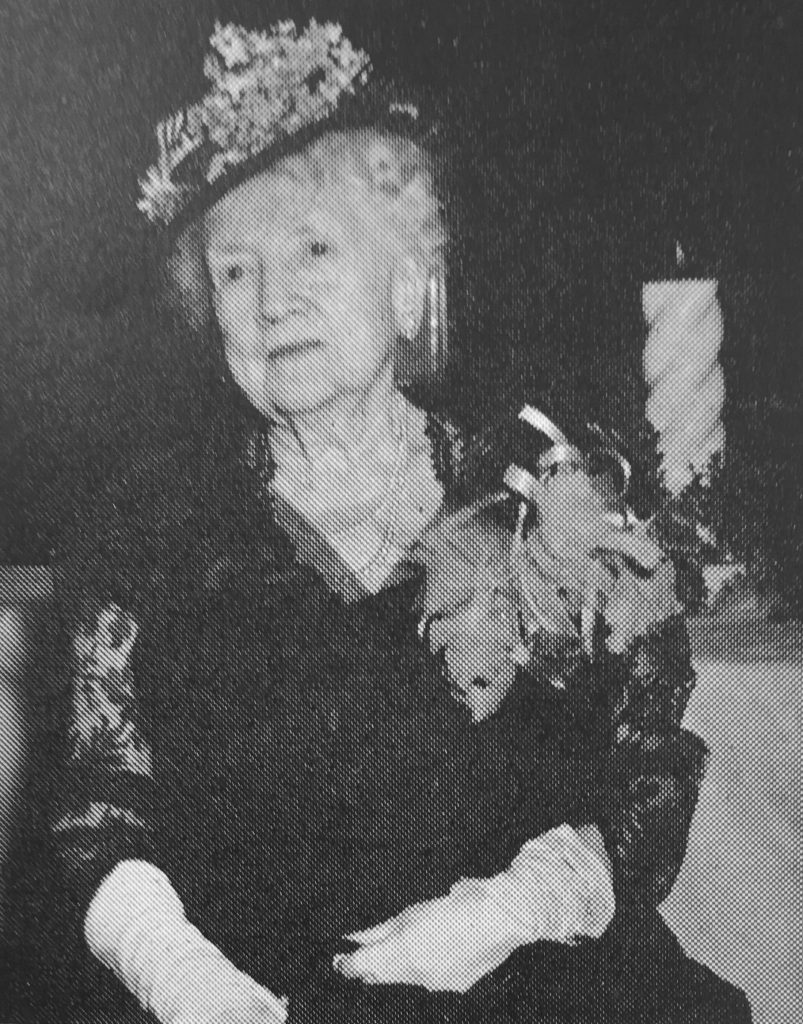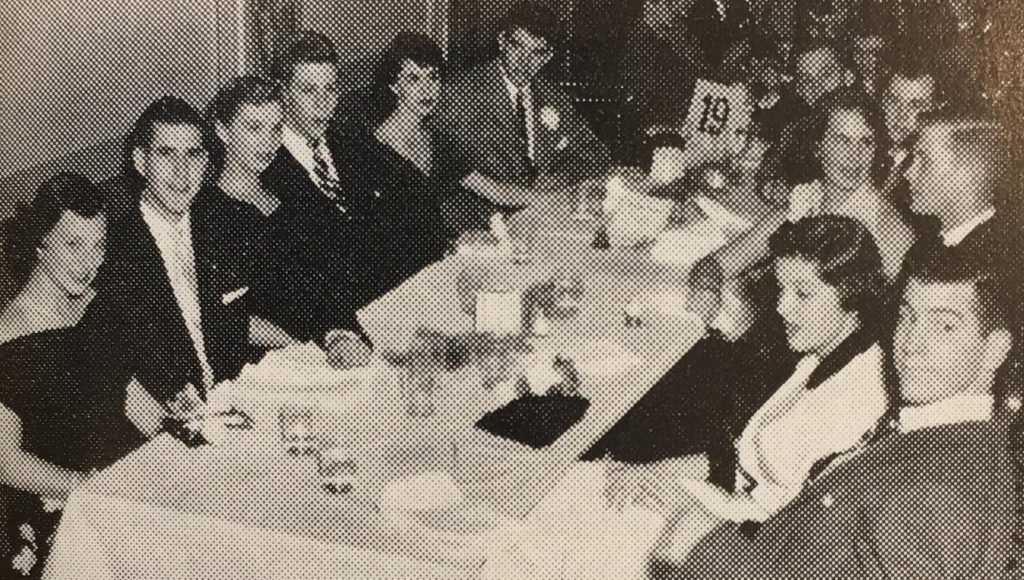 Holiday flowers? We’re thinking hyacinths. Why? In honor of Mary Adele Bryant Georgen, known as Adele, who served for many years as the hostess (the term in use at the time) of the Yuletide Tea Dance. The winter event at the Muehlebach Hotel (now the Muehlebach Tower of the Kansas City Marriott Downtown) was a bright spot for those still in the springtime of their lives. Hyacinths were part of Adele’s family history. As she told the Kansas City Star in 1929, “Our ancestor, James Bryant, and his wife, who was Elizabeth La Favre, came to Manakintown, Virginia, in 1700, and brought hyacinth bulbs from England.” They accompanied members of the family on subsequent moves to Kentucky and then to Missouri. Nearly eight decades later, Adele still enjoyed gathering the cameo pink hyacinth blossoms.
Holiday flowers? We’re thinking hyacinths. Why? In honor of Mary Adele Bryant Georgen, known as Adele, who served for many years as the hostess (the term in use at the time) of the Yuletide Tea Dance. The winter event at the Muehlebach Hotel (now the Muehlebach Tower of the Kansas City Marriott Downtown) was a bright spot for those still in the springtime of their lives. Hyacinths were part of Adele’s family history. As she told the Kansas City Star in 1929, “Our ancestor, James Bryant, and his wife, who was Elizabeth La Favre, came to Manakintown, Virginia, in 1700, and brought hyacinth bulbs from England.” They accompanied members of the family on subsequent moves to Kentucky and then to Missouri. Nearly eight decades later, Adele still enjoyed gathering the cameo pink hyacinth blossoms.
Adele was the daughter of Amanda Hughes Bryant and William L. Bryant of Independence, Missouri. Her siblings were Aileen and Hughes. Adele was as deeply rooted in Our Town as those hyacinths. According to the Kansas City Times, “She was a descendant of Oliver C. Caldwell, one of the 14 men who bought the Prudhomme estate in 1838, which formed a section of the townsite of Kansas City.” Adele attended Woodland College in Independence. Her uncle George S. Bryant was the school’s president. Another uncle, Dr. John Bryant, was the owner of the Bryant Building downtown, (which was later replaced by an Art Deco edifice bearing the same name). On April 3, 1894, Adele married John Georgen, who was a lawyer. The couple became the parents of two daughters, Dorothy Georgen (who wed Robert Estill LaForce in 1916) and Ella Hughes Georgen (who became the bride of Francis Poindexter in 1920). The Georgens resided in Independence for most of their marriage. During the early years of the 20th century, Adele and John designed their own house, which they built at 933 South Main Street.
The Yuletide Tea Dance was held for decades at the Muehlebach, which opened in May 1915. That December our columnist Betty Ann wrote, “Nearly five hundred young folk were dancing to the twang of the banjos at the Muehlebach dansant last Tuesday.” That was the precursor to the Yuletide Tea Dance, which was intended for high school and college students. For some years prior to her death in 1928, Janette Dodson Harmon (Mrs. Horatio L. Harmon) was the hostess.
Adele had a special bond with children and young people. She worked as a representative for academic institutions, including the Colonial School for Girls, Chevy Chase Junior College, and Greenbrier College. It isn’t clear exactly when she became involved with the Yuletide Tea Dances, but by the mid-1930s, Adele was the hostess, a role she would fulfill until she was well into her eighties. As she said, she wanted to “give the youngsters something to look forward to on the day after Christmas.”
Of the 1938 event, our scribe wrote. “The great ballroom, hung with chaste garlands of smilax, evergreen wreaths tied with crimson bows and mammoth-sized Christmas trees, lent a brilliant background for the three hundred YOUNG THINGS who danced from four until six o’clock.” (Yes, we’re wondering about the use of the word “chaste” in describing the garlands. Perhaps only the adults were allowed to have parties with riotous floral arrangements.)
1943 was wartime, but there was no let-up in the pageantry of the assembly. “’Twas an inspirational patriotic background that met the eye when the curtain rolled up on Monday afternoon as hundreds of the young setters gathered for the gala party… The entire mezzanine was trellised with holly and the flags of our allies. The music of Dutch Holland and his boys was a gay allotment of ‘Hit Parade’ tunes with a sprinkling of ‘Star Spangled Banner’ and the ubiquitous ‘Blue Danube’… Added thrills when two distinguished lieutenants who had flown in from the West Coast ‘phoned Mrs. John Georgen, the tea dance’s incomparable hostess, for the privilege of ‘seeing Kay Cee dance.’”

Judy Henry, daughter of the Jack Henrys, was hostess to a group of collegiate young setters. Shown are, clockwise, l. to r.: hostess Judy, Mark Nardyz, Jan Gambrel, Lewis Dail, Karen Van Voorst, John Woodbury, Kip Longan, George Hicks, Joan Knight, Fred Rice of Maui, Hawaii, Katharine McGuire and Jim Tinsman. Reprinted from the January 10, 1953 issue of The Independent.
The party usually started at 3 p.m. on the 26th, and as many as 700 guests attended. Students from Barstow, Sunset, Notre Dame, Pem-Day, and Southwest (among other schools) frequently sat with their classmates. Parents often reserved tables, allowing their children to invite friends. A light dinner was served, with ham buns and hot chocolate being popular menu choices.
The Georgens moved to 5916 Wyandotte Street in Kansas City late in their lives. John was the oldest member of the Kansas City Bar Association prior to his death at the age of 90 in June 1958. He had retired in 1954, after 67 years in practice. In the mid-1950s, Jacqueline Royster Hedges, who was known as Jackie (and was later Mrs. James Clark), succeeded Adele as hostess. Adele died in July 1963. She was 91 years old. In The Independent’s obituary, our scribe praised Adele for “every year deepening the original plan of the dances to make them a truly traditional part of Kansas City’s social life.”
The Yuletide Tea Dance continued, with Jackie at the helm, through 1968. In 1969, an announcement was made that the event wouldn’t be held that year. Anyone familiar with 1960s history will be able to tick off a list of reasons, starting with the fact that most young people weren’t interested in ballroom dancing anymore. To a large degree, what the adolescents of the 1930s and 1940s viewed as glamorous and cosmopolitan appeared staid to their offspring. Interviewed in the late 1970s, Jackie put part of the blame for the event’s demise on the popularity of ski trips. It seems people were heading out of town to celebrate the season. In 2020, with the festivities set to take place, if at all, on Zoom, we’re nostalgic for every minute of it.
Also featured in the December 19, 2020 issue of The Independent
By Heather N. Paxton